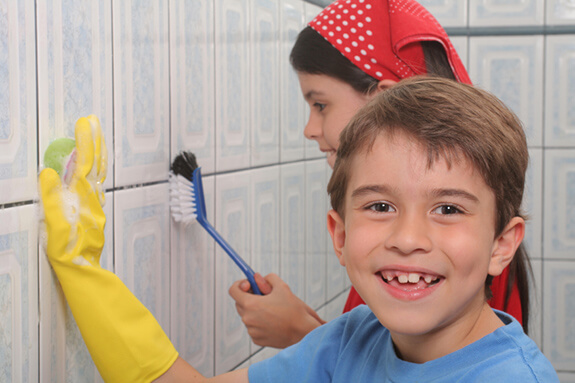Making House Cleaning Fun for Kids
With today's busy lifestyles, parents have a hard time working, ushering their kids from one activity to the next, and keeping their house clean. One of the biggest challenges to keeping a tidy house is teaching those who live there how to keep it tidy. Kids should not be left out of the day-to-day housekeeping duties, especially since they contribute to the disorganization that happens daily.

Willingness to Help
When kids are young, they enjoy helping others. They are enthusiastic and willing to do any job as long as they are helping. Why not take advantage of that willingness? Start them with small things like dusting or straightening the shoes by the door. As they grow older and can understand more directions, they can take on more tasks like vacuuming and dusting. Make sure the tasks are age and ability appropriate so the child does not get frustrated if he cannot complete the task.
Turn Cleaning Into a Game
As they grow, their enthusiasm for helping is not as high as their desire to play. However, they can still be encouraged to help with the cleaning. Kids love to play games, especially with adults. This also works well with siblings. Here are some ideas for fun cleaning games:
- If you have a plush carpet, ask the child to vacuum it into a pattern like a rectangle or straight lines. (Remember, it needs to be simple enough for the child to do with the vacuum cleaner.)
- Make a scavenger hunt or bingo board for lost dishes, clothing or other items lying around the house. Have baskets available for them to hold their “treasures” and, after the items are counted, have a race to see who can put their items away the fastest.
- Sorting socks is a task nobody really wants to do. However, matching games are fun for many kids, and what a perfect game to play with unpaired socks! For socks with no mates, make them into dusting puppets that the child can use to dust the house.
Remember to reward them after the game is over. If you are only doing the game once a week, treat them to their favorite snack when the game is over. If you are spreading the games out over the course of the week, smaller rewards such as toys cars or taking them to the park will drum up the energy and enthusiasm for playing the “cleaning game.” Rewards should be given immediately after the game. If the child has to wait to receive the award, they will be less likely to play the game the next time.
Earning Their Way
Of course, as kids get into their teen years, their willingness to help will have waned considerably, and they will no longer view housecleaning as a game. However, they do have wants that usually require money. Pre-teens and teenagers are quite motivated by money. Create a price list for certain chores that they can do around the house. When creating the list, do not dismiss a pre-teen or teenager's ability to cook and do laundry. They will need supervision and some instruction at first, but these can be valuable skills that they need in their adult life.
For older teens, higher prices can be set for cleaning those items that are only cleaned once or twice a year, such as pulling out the refrigerator to clean behind it or emptying the cupboards and cabinets to clean the insides.
Describe the Chores
Telling kids to “clean the bathroom” may sound like a simple thing, but if the child has never cleaned a bathroom, they may not know what is required of them. Sit down and create a list of all the items that need to be cleaned and how to properly clean them. Each room should have a list of specific items that need to be cleaned (e.g., toilet, sink, bathtub), the supplies needed to clean them (e.g., sponge, toilet brush) and how often those areas should be cleaned.
It may take time for them to learn how to do each task properly. However, once they understand what is required of them to complete the task, they should be able to do the tasks with little to no supervision. Helping to clean the house will teach the kids responsibility as well as give them a sense of accomplishment and independence.



Leave a Reply